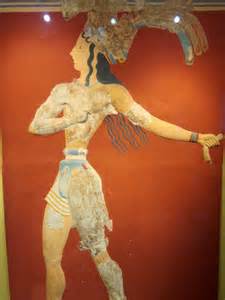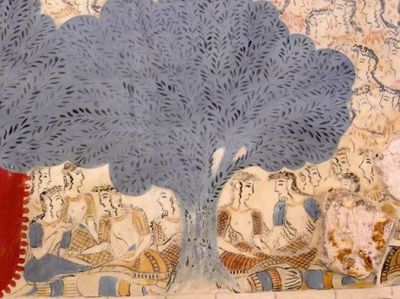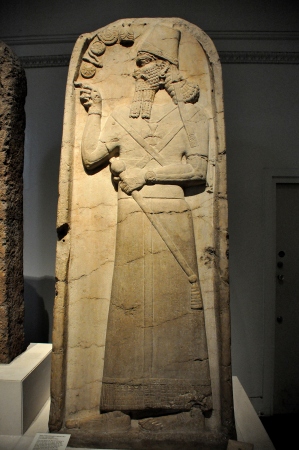No matter how carefully developed they are, theories of female power in pre-patriarchal societies are dismissed in academic circles as “romantic fantasies” of a “golden age” based in “emotional longings” with “no basis in fact.” I was reminded of this while reviewing three books about the Goddess last week.
In one of the books, the co-authors, who define themselves as feminists, summarily dismiss theories about the origins of Goddess worship in pre-patriarchal prehistory. In another, the author traces the origin of certain Goddess stories and symbols found in recent folklore back to the beginnings of agriculture. Inexplicably, she stops there, not even mentioning the theory that women invented agriculture. Considering that possibility might have suggested that the symbols and stories the she was investigating were developed by women as part of rituals connected to the agricultural cycle. To ask these questions would have raised a further one: the question of female power in prehistory. And this it seems is a question that cannot be asked. This question was addressed in the third (very scholarly) book, which I fear will simply be ignored.

- Prince of the Lilies or Young Female Bull-leaper?
When I mentioned my unease with the first two books to a friend who is friends with a number of archaeologists, she commented, “Archaeologists won’t say anything that cannot be proved.” “Not so,” I responded, “archaeologists will say a lot of things that cannot be proved. What they won’t do is put forward theories that challenge the idea that our culture, the modern western culture which is based on ancient Greek culture, is the highest culture in the history of the world." I believe that the work of Marija Gimbutas is being dismissed as nothing more than "romantic fantasy" because she dared to suggest that the religion and culture of Neolithic Old Europe might have been superior to those that came after it.
As I thought about these books, a discussion I had last summer with two male archaeologists kept creeping back into my mind. Beginning from our common assumption that the Goddess was the main deity in ancient Crete and that there was no evidence for war, I suggested to them that patriarchy and warfare arise together: the earliest kings are warrior kings. Thus, I continued, if Minoan Crete did not have war, it probably did not have kings.

- Women in place of honor at ritual performance in ancient Crete
I referred this conversation in a previous blog in which I presented rational arguments for the view that Crete was not ruled by a king. I outlined recent challenges to Arthur Evans’ reconstruction of the image of male rulership he named the Prince of the Lilies. I suggested that if kingship is not universal, then it must be symbolically articulated. In the absence of images of powerful kings, we should assume that kingship did not exist.
In the earlier blog, I did not mention the emotional nature of the discussion that ensued with my male colleagues. Before our discussion even got off the ground, one of the men interjected: “You shouldn’t blame men for warfare and all the evil associated with it. After all, there were women guards at the death camps in Nazi Germany.” Surprised that the conversation so quickly turned to the Holocaust, I responded that I did not blame men, but rather a social structure known as patriarchy for the evil of Nazi Germany, adding that women have always participated in patriarchy. The discussion continued on an emotional level, as the two men debated the point I had already conceded: that men are not intrinsically evil or responsible for all the evil in the world. We never returned to the question of kings in Crete.

- Assyrian King Shamshi Adad V
This story suggests that “emotional issues” are easily evoked on the other side of the debate about female power in prehistory. In this case, the mere suggestion that Crete might not have been ruled by kings led to an emotional outburst based in fear—fear that discussion of alternatives to patriarchy is tantamount to blaming men for all of the evil in the world. I was unsettled by this turn in the conversation, but surprisingly, I managed to maintain my cool. I did not react emotionally. I kept trying to return the conversation to discussion of evidence. The discussion continued to revolve around the stated and unstated fear that men might in fact be evil or responsible for all of the evils in the world.
I have been thinking about this conversation off and on ever since. In retrospect, I am relieved that the emotional issues underlying the discussions of female power in prehistory were so clearly exposed. “Am I evil?” “Are men inherently evil?” These are the suppressed and repressed questions that were coming to the surface. I reiterate that no amount of assurance on my part that men are not inherently evil could stem these emotional responses.
There are indeed emotional issues, longings, and fantasies connected to the discussion of female power in prehistory. The emotion that is hampering scholarly discussion is not the longing for a golden age. The evidence for or against scholarship based in such longings can be discussed and debated. The emotion that is hampering the discussion is the fear that pre-patriarchal societies might have existed. Until this fear and the loathing associated are confronted, important questions--questions that may even be crucial to our survival as a species--will continue to be dismissed and ignored.
Carol P. Christ is author or editor of eight books in Women and Religion and is one of the Foremothers of the Women’s Spirituality Movement. She leads the Goddess Pilgrimage to Crete in Spring and Fall. Photo of Carol by Andrea Sarris.
 A Serpentine Path: Mysteries of the Goddess
A Serpentine Path: Mysteries of the Goddess will be published by Far Press in the spring of 2016. A journey from despair to the joy of life.
will be published by Far Press in the spring of 2016. A journey from despair to the joy of life.
Goddess and God in the World: Conversations in Embodied Theology with Judith Plaskow will be published by Fortress Press in June 2016. Exploring the connections of theology and autobiography and alternatives to the transcendent, omnipotent male God.
Also published on Feminism and Religion.